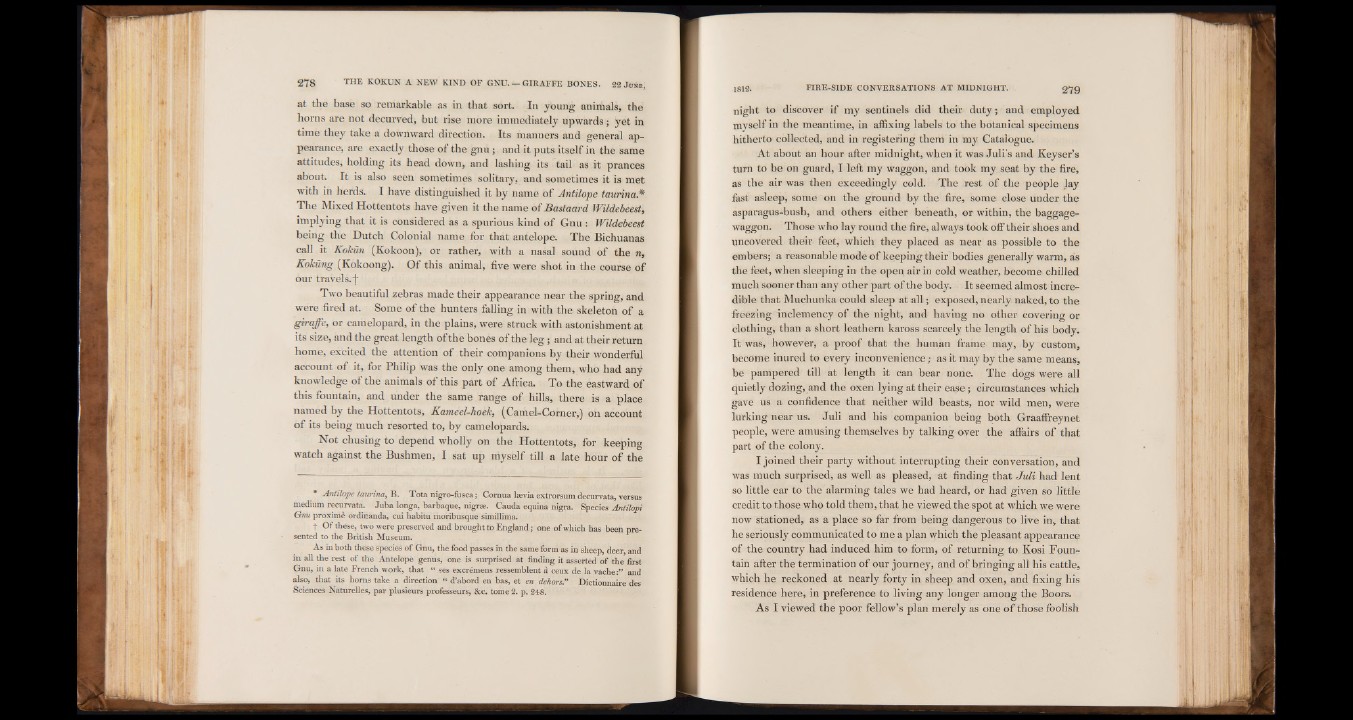
at the base so remarkable as in that sort. In young animals, the
horns are not decurved, but rise more immediately upwards; yet in
time they take a downward direction. Its manners and general appearance,
are exactly those of the gnu; and it puts itself in the same
attitudes, holding its head down, and lashing its tail as it prances
about. It is also seen sometimes solitary, and sometimes it is met
with in herds. I have distinguished it by name of Antilope taurina.*
The Mixed Hottentots have given it the name of Bastaard Wildebeest,
implying that it is considered as a spurious kind of Gnu : Wildebeest
being the Dutch Colonial name for that antelope. The Bichuanas
call it Kokun (Kokoon), or rather, with a nasal sound of the n,
Kokung (Kokoong). Of this animal, five were shot in the course of
our travels.')'
Two beautiful zebras made their appearance near the spring, and
were fired at. Some of the hunters falling in with the skeleton of a
giraffe, or camelopard, in the plains, were struck with astonishment at
its size, and the great length of the bones of the leg ; and at their return
home, excited the attention of their companions by their wonderful
account of it, for Philip was the only one among them, who had any
knowledge of the animals of this part of Africa. To the eastward of
this fountain, and under the same range of hills, there is a place
named by the Hottentots, Kameel-hoek, (Camel-Corner,) on account
of its being much resorted to, by camelopards.
Not chusing to depend wholly on the Hottentots, for keeping
watch against the Bushmen, I sat up myself till a late hour of the
* Antilope taurina, B. Tota nigro-fusca; Cornua Isevia extrorsum decurvata, versus
medium recurvata. Juba longa, barbaque, nigra-. Cauda equina nigra. Species Antilqpi
Gnu proxime ordinanda, cui habitu moribusque sunillima.
t Of these, two were preserved and brought to England; one of which has been presented
to the British Museum.
As in both these species of Gnu, the food passes in the same form as in sheep, deer, and
in all the rest of the Antelope genus, one is surprised at finding it asserted of the first
Gnu, in a late French work, that “ ses excremens ressemblent a ceux de la vachei” and
also, that its horns take a direction “ d’abord en bas, et en dehors.” Dictionnaire des
Sciences Naturelles, par plusieurs professeurs, &c. tome 2. p. 248.
night to discover if my sentinels did their duty; and employed
myself in the meantime, in affixing labels to the botanical specimens
hitherto collected, and in registering them in my Catalogue.
At about an hour after midnight, when it was Julis and Iteyser’s
turn to be on guard, I left my waggon, and took my seat by the fire,
as the air was then exceedingly cold. The rest of the people lay
fast asleep, some on the ground by the fire, some close under the
asparagus-bush, and others either beneath, or within, the baggage-
waggon. Those who lay round the fire, always took off their shoes and
uncovered their feet, which they placed as near as possible to the
embers; a reasonable mode of keeping their bodies generally warm, as
the feet, when sleeping in the open air in cold weather, become chilled
much sooner than any other part of the body. It seemed almost incredible
that Muchunka could sleep at all; exposed, nearly naked, to the
freezing inclemency of the night, and having no other covering or
clothing, than a short leathern kaross scarcely the length of his body.
It was, however, a proof that the human frame may, by custom,
become inured to every inconvenience; as it may by the same means,
be pampered till at length it can bear none. The dogs were all
quietly dozing, and the oxen lying at their ease; circumstances which
gave us a confidence that neither wild beasts, nor wild men, were
lurking near us. Juli and his companion being both Graaffreynet
people, were amusing themselves by talking over the affairs of that
part of the colony.
I joined their party without interrupting their conversation, and
was much surprised, as well as pleased, at finding that Juli had lent
so little ear to the alarming tales we had heard, or had given so little
credit to those who told them, that he viewed the spot at which we were
now stationed, as a place so far from being dangerous to live in, that
he seriously communicated to me a plan which the pleasant appearance
of the country had induced him to form, of returning to Kosi Fountain
after the termination of our journey, and of bringing all his cattle,
which he reckoned at nearly forty in sheep and oxen, and fixing his
residence here, in preference to living any longer among the Boors.
As I viewed the poor fellow’s plan merely as one of those foolish